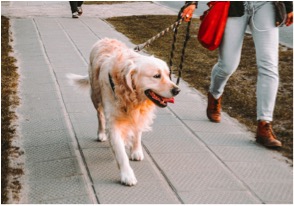Gina Spadafori, the author of VetStreet, eloquently explains, “Your dog doesn’t realize that he’s getting older. His gray hairs don’t cause concern. He doesn’t count the number of times he can fetch a ball before tiring and compare that to his performance when he was a young dog in his prime. A dog lives in the now. He doesn’t reflect on his past; he can’t imagine his future. Your dog takes his cues from you. When you’re upbeat, encouraging and loving, he’ll be at his best. Your dog’s health is not entirely in your control, but you can have a real impact on his attitude.”
This time in your pet’s life can be a special experience for both of you. Embrace age-related changes you see in your pet, provide extra tender loving care and check off bucket list experiences to strengthen your bond and create memories to cherish.
Here are some tips for keeping senior pets content.
1. Increase the frequency, but decrease the intensity of exercise.
Your dog may not be able to romp through the park or your cat may not chase the laser pointer for hours on end anymore. Instead of insisting upon high-intensity cardio, try low impact activities such as walking at a gentle pace. Exercise is essential to your pet’s health, but your pet must remain comfortable while they are doing it. If physical activity becomes stressful, painful, or difficult for your pet, discuss your concerns with your veterinarian. They will likely recommend helpful treatments such as anti-inflammatory medications, joint supplements, laser therapy, or acupuncture.
 2. Keep your pet fit and trim.
2. Keep your pet fit and trim.
Arthritis is a common issue for many of our senior cats and dogs. Maintaining a good body condition helps to reduce extra strain on joints, bones and soft tissue structures. Active pets maintain muscle strength and flexibility. Consider a senior formulated diet, and search for ones that contain glucosamine and omega-3 fatty acids for joint health.
3. Don’t skimp on padding and soft bedding.
Soft, thick and easy to access cushioned bedding will cradle your pets’ body like a big hug. This extra padding provides additional comfort and support for old bones.
4. Provide non-slip flooring.
Hardwood and tile floors are beautiful but do not offer much traction. When pets get older, slippery floors can become difficult to maneuver. Carpets, carpet runners, and yoga mats in high traffic areas are a helpful addition to your home.
5. Not the best time to rearrange the furniture.
Your pet’s eyesight may not be what it used to be, but most are able to navigate familiar environments despite the decline in vision. Avoid dramatic physical changes to your pet’s environment so that they remain confident and comfortable.
 6. Think toasty!
6. Think toasty!
Older pets have a hard time regulating their body temperature. You may find them snuggling next to warm air vents or lying in the sun. For this reason, make sure your house is toasty warm and consider a nice sweater or blanket for your pet when going outside during the colder months.
7. Limit the stairs. Provide ramps for ease.
Single floor living may be easier on your pets. If they are used to jumping up on the couch, bed, or car, consider ramps to make higher places easier access.
8. Consider the litter box.
If your cat is going to the bathroom outside the litter box, you will need to investigate the cause. It is always a good idea to rule out any medical condition that may be responsible for litter box issues. If your cat is having trouble physically getting into the box you will need to cut down the height of the entrance/exit to the box. If your cat is having trouble holding the squat position, causing them to urinate over the edges of the box, purchase a box with high sides. Discuss pain management with your veterinarian. If all else fails, invest in puppy training pads to help control the cleanup.
9. Time and Patience.
Invest in time with your senior pets. They, sadly, do not have many years left and you will want to make the best of the time you have. Be patient with their growing needs and allow for the extra time and amenities they require and surely deserve.
 10. Make a Senior Checkup at LVC.
10. Make a Senior Checkup at LVC.
It may be number 10 on our list, but an office visit and senior exam at Longwood Veterinary Center is the number one thing you can do for your senior pets. Early disease detection, pain management, and oral health assessment will keep your pet happy and comfortable through their senior years.
The staff here at Longwood Veterinary Center, located near Greenville, DE, are committed to lifelong compassionate veterinary care. We encourage our senior pet parents to discuss their observations, questions, or concerns. We will guide you with kindness and empathy offering medical, behavioral, and environmental recommendations to improve your pet’s life.
Are you interested in learning more about the care of senior pets? Check out this website from the AVMA: https://www.avma.org/public/PetCare/Pages/Caring-for-an-Older-Pet-FAQs.aspx.
Written By: Tara Corridori, LVT
Edited By: Corrina Parsons, VMD
